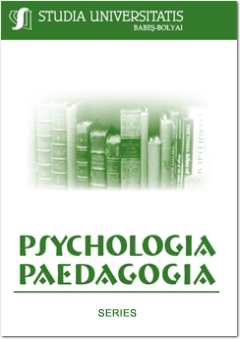THERAPISTS’ PERCEPTIONS: ADDED VALUES OF DMT AND CBT FOR CHILDREN WITH ADs’
THERAPISTS’ PERCEPTIONS: ADDED VALUES OF DMT AND CBT FOR CHILDREN WITH ADs’
Author(s): Naomi Weitz, Nicolae Adrian OpreSubject(s): Social Sciences, Psychology, Clinical psychology
Published by: Studia Universitatis Babes-Bolyai
Keywords: DMT; CBT; anxiety disorders; children; therapist’s perceptions;
Summary/Abstract: Anxiety disorders (ADs) are common among children. Many types of psychological treatments exist, including: Cognitive Behavioral Therapy (CBT), psychodynamic treatments, Play therapy and expressive arts therapies such as Dance Movement Therapy (DMT). DMT and CBT are based on distinct theoretical assumptions and therefore are inherently different. Nonetheless, in the last decade, these approaches are becoming closer. The aim of the present study was to examine therapists’ perceptions of the added value of each therapy approach (DMT/CBT) to the other, when treating children with ADs. The study utilized a quantitative design. The sample included 99 therapists in three groups: DMT-only (n = 35), CBT-only (n = 42), and combined DMT+CBT (n = 22). As hypothesized, the findings indicated that DMT+CBT therapists and therapists who use only one type of the treatment (DMT-only/CBT-only) perceive a higher added value of their treatment’s principles compared to therapists who use only the other type of treatment. All therapists perceive a high added value of CBT to DMT, whereas the added value of DMT to CBT is perceived significantly higher by DMT+CBT therapists and DMT-only therapists in comparison to CBT-only therapists. The novelty lies in the therapists’ perceiving the combination of both treatments as possible in treating children with ADs. The combination of both therapies implies that they have connections and common principles. Concurrently, the differences between them create a combined treatment in which each approach complements the other and therefore provides and facilitates a broader response for children with ADs.
Journal: Studia Universitatis Babes-Bolyai - Psychologia-Paedagogia
- Issue Year: 64/2019
- Issue No: 1
- Page Range: 5-22
- Page Count: 18
- Language: English

